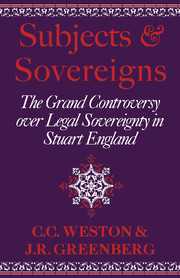Book contents
- Frontmatter
- Contents
- Dedication
- Preface
- 1 The shift in political thought
- 2 The keeper of the kingdom
- 3 The new age of political definition
- 4 That ‘Poisonous Tenet’ of co-ordination
- 5 The curious case of William Prynne
- 6 The idiom of restoration politics
- 7 Co-ordination and coevality in exclusion literature
- 8 The law-makers and the dispensing power
- Appendix: Co-ordination and resistance at the Revolution
- Notes
- Bibliography
- Index
5 - The curious case of William Prynne
Published online by Cambridge University Press: 08 October 2009
- Frontmatter
- Contents
- Dedication
- Preface
- 1 The shift in political thought
- 2 The keeper of the kingdom
- 3 The new age of political definition
- 4 That ‘Poisonous Tenet’ of co-ordination
- 5 The curious case of William Prynne
- 6 The idiom of restoration politics
- 7 Co-ordination and coevality in exclusion literature
- 8 The law-makers and the dispensing power
- Appendix: Co-ordination and resistance at the Revolution
- Notes
- Bibliography
- Index
Summary
With the exceptions of Charles I and Charles Herle, the Presbyterian William Prynne more than any other individual imparted a distinctive shape and direction to the seventeenth-century controversy over the co-ordination principle in law-making, which was in turn indispensable to the ascendant theory of a parliamentary sovereignty in king, lords, and commons. He was influenced by the principle in writing the notorious Soveraigne Power of Parliaments, and it became prominent once more in his angry response to Leveller propaganda and the constitutional changes at the end of the civil war. He now undertook an historical investigation of early parliaments aimed at demonstrating from the past that the king and the house of lords were legitimate elements in the government of his own day. His chief concern was to support the house of lords: the peers were not sons of the Norman conquest, as the Levellers had contemptuously proclaimed; on the contrary, they had sat in parliament for hundreds of years before the conquest.
Prynne's historical studies of the 1650s and 1660s had a mixed effect on the general acceptance of the co-ordination principle. If its credibility was enhanced on the one hand by his successful elevation of the king and the house of lords in public esteem at a time when their political authority was under steady fire, still he set in motion the opposite intellectual process.
- Type
- Chapter
- Information
- Subjects and SovereignsThe Grand Controversy over Legal Sovereignty in Stuart England, pp. 124 - 148Publisher: Cambridge University PressPrint publication year: 1981



